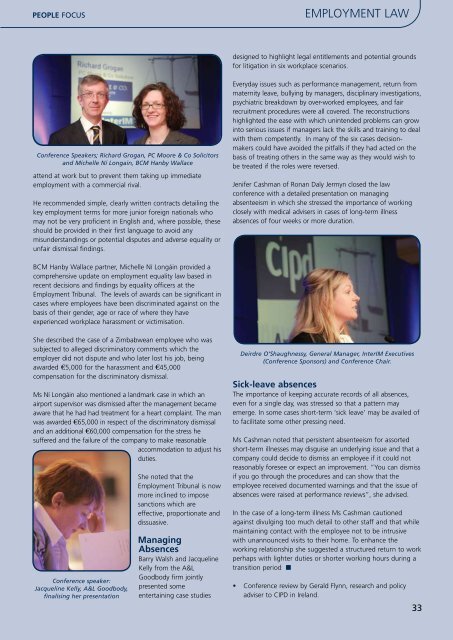PEOPLE FOCUS - CIPD
PEOPLE FOCUS - CIPD
PEOPLE FOCUS - CIPD
- TAGS
- people
- focus
- cipd
- www.cipd.co.uk
Create successful ePaper yourself
Turn your PDF publications into a flip-book with our unique Google optimized e-Paper software.
<strong>PEOPLE</strong> <strong>FOCUS</strong> EMPLOYMENT LAW<br />
Conference Speakers; Richard Grogan, PC Moore & Co Solicitors<br />
and Michelle Ní Longain, BCM Hanby Wallace<br />
attend at work but to prevent them taking up immediate<br />
employment with a commercial rival.<br />
He recommended simple, clearly written contracts detailing the<br />
key employment terms for more junior foreign nationals who<br />
may not be very proficient in English and, where possible, these<br />
should be provided in their first language to avoid any<br />
misunderstandings or potential disputes and adverse equality or<br />
unfair dismissal findings.<br />
BCM Hanby Wallace partner, Michelle Ní Longáin provided a<br />
comprehensive update on employment equality law based in<br />
recent decisions and findings by equality officers at the<br />
Employment Tribunal. The levels of awards can be significant in<br />
cases where employees have been discriminated against on the<br />
basis of their gender, age or race of where they have<br />
experienced workplace harassment or victimisation.<br />
She described the case of a Zimbabwean employee who was<br />
subjected to alleged discriminatory comments which the<br />
employer did not dispute and who later lost his job, being<br />
awarded €5,000 for the harassment and €45,000<br />
compensation for the discriminatory dismissal.<br />
Ms Ní Longáin also mentioned a landmark case in which an<br />
airport supervisor was dismissed after the management became<br />
aware that he had had treatment for a heart complaint. The man<br />
was awarded €65,000 in respect of the discriminatory dismissal<br />
and an additional €60,000 compensation for the stress he<br />
suffered and the failure of the company to make reasonable<br />
accommodation to adjust his<br />
duties.<br />
Conference speaker:<br />
Jacqueline Kelly, A&L Goodbody,<br />
finalising her presentation<br />
She noted that the<br />
Employment Tribunal is now<br />
more inclined to impose<br />
sanctions which are<br />
effective, proportionate and<br />
dissuasive.<br />
Managing<br />
Absences<br />
Barry Walsh and Jacqueline<br />
Kelly from the A&L<br />
Goodbody firm jointly<br />
presented some<br />
entertaining case studies<br />
designed to highlight legal entitlements and potential grounds<br />
for litigation in six workplace scenarios.<br />
Everyday issues such as performance management, return from<br />
maternity leave, bullying by managers, disciplinary investigations,<br />
psychiatric breakdown by over-worked employees, and fair<br />
recruitment procedures were all covered. The reconstructions<br />
highlighted the ease with which unintended problems can grow<br />
into serious issues if managers lack the skills and training to deal<br />
with them competently. In many of the six cases decisionmakers<br />
could have avoided the pitfalls if they had acted on the<br />
basis of treating others in the same way as they would wish to<br />
be treated if the roles were reversed.<br />
Jenifer Cashman of Ronan Daly Jermyn closed the law<br />
conference with a detailed presentation on managing<br />
absenteeism in which she stressed the importance of working<br />
closely with medical advisers in cases of long-term illness<br />
absences of four weeks or more duration.<br />
Deirdre O’Shaughnessy, General Manager, InterIM Executives<br />
(Conference Sponsors) and Conference Chair.<br />
Sick-leave absences<br />
The importance of keeping accurate records of all absences,<br />
even for a single day, was stressed so that a pattern may<br />
emerge. In some cases short-term ‘sick leave’ may be availed of<br />
to facilitate some other pressing need.<br />
Ms Cashman noted that persistent absenteeism for assorted<br />
short-term illnesses may disguise an underlying issue and that a<br />
company could decide to dismiss an employee if it could not<br />
reasonably foresee or expect an improvement. “You can dismiss<br />
if you go through the procedures and can show that the<br />
employee received documented warnings and that the issue of<br />
absences were raised at performance reviews”, she advised.<br />
In the case of a long-term illness Ms Cashman cautioned<br />
against divulging too much detail to other staff and that while<br />
maintaining contact with the employee not to be intrusive<br />
with unannounced visits to their home. To enhance the<br />
working relationship she suggested a structured return to work<br />
perhaps with lighter duties or shorter working hours during a<br />
transition period ■<br />
• Conference review by Gerald Flynn, research and policy<br />
adviser to <strong>CIPD</strong> in Ireland.<br />
33

















